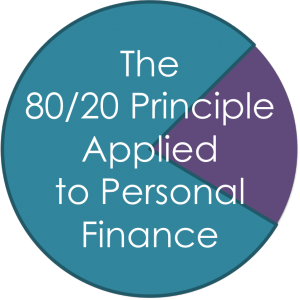The 80/20 Rule Applied to Personal Finance
I’m sure that most of you are familiar with the 80/20 rule or the Pareto principle, but in case you aren’t…
The basic idea is that 80% of outcomes can be attributed to 20% of causes (Investopedia). This originated as a business principle but has been loosely applied in many other areas.
This post from Money Peach on excuses for not budgeting (and counter-arguments) really got me thinking about how simple most of personal finance is. Really, 80% (or probably 90 or 95%) of the positive results you can achieve in personal finance come from applying only a small set of simple principles. You don’t need to have a bunch of technical knowledge or enact some complicated strategy to do very well with money. Sure, having that knowledge or strategy might help you super optimize your results around the edges, but it’s really not necessary to get the bulk of the work done. (This is quite related to the energy-to-payoff ratio that I discussed previously.)
When people overlook implementing the effective 20% in favor of learning about the less effective 80%, one of two things tends to happen: They become either intimidated or disappointed. The intimidated people think they have to know and do 100% and therefore don’t even engage because it’s overwhelming. The disappointed are looking for some kind of magic bullet in the 80%, which they use as a reason to not get started with the 20% that they already know. They don’t want to hear about other people’s success with the effective 20% because to them it’s too familiar or simplistic.
And I think that personal finance enthusiasts, of which I am of course one, and particularly the personal finance community online, really contribute to this problem. Many of us have so well-mastered the 20% (or think we have) that we become super interested in the 80% and talk about it far too much!
I’m going to start a list of the simple practices (the 20% of causes) that gain most of the results (80% of outcomes) any of us would like to see within personal finance. Please continue the list in the comments!
Managing money: Being intentional with your money helps you to use in on what you value the most instead of on what you don’t value much, thus maximizing your satisfaction. Implementing a budget of any kind and tracking your spending will go very, very far in helping you achieve this, and they aren’t difficult or time-consuming. You don’t have to go down the rabbit hole of having the perfect method of budgeting, perfect budget amounts, perfect budgeting software, perfect tracking/categorizing, etc. Budgeting is such a personal matter, anyway, that you should just find your own way and not spend too much time learning how other people do it.
Saving: Saving for your present and your future helps you minimize uncertainty and maximize your control over your life. Just do it. Choose whatever works best for you in terms of where to save, calculating precisely how much to save from which income streams, and psychological tricks to help you increase your savings rate. You don’t have to have your saving method fully optimized for it to be effective overall.
Investing: This category really trips people up because of the stereotype that all investors are day traders or active managers of their money. For goodness sakes, just put your investments in a few broad index funds in an allocation (aka ratio) that is appropriate for your time horizon and risk tolerance and call it a day! This is one category where trying to implement a complicated strategy can actually worsen your results (cough cough active management, expensive investment products).
Credit cards: Credit cards are a tool, but one that can easily and quickly spin out of your control. If you choose to use them at all, use them exactly as you would a debit card. Complicated strategies like reward chasing, balance transfers, and 0% interest offers definitely only make minor improvements to your life, if any.
What are the 20% of your strategies that you think get you 80% of your results? Have you ever skipped over an aspect of the effective 20% in favor of becoming mesmerized with the other 80%?
Filed under: budgeting, savings · Tags: 80/20 rule, Pareto principle


 Why I Love Personal Finance: Universal Math Meets Individual Values
Why I Love Personal Finance: Universal Math Meets Individual Values How I Developed an Interest in Personal Finance
How I Developed an Interest in Personal Finance Personal Finance Bloggers I Admire
Personal Finance Bloggers I Admire The Real Reason I Am into Personal Finance
The Real Reason I Am into Personal Finance


The 80-20 rule is really awesome! Though I am not totally successful at it, but it somehow guarantees results and has helped me achieve my financial goals. Saving and investing are what I think very important in this rule.
I agree, it doesn’t take much knowledge to get started with saving and investing and a bit of effort can take you so far!
I didn’t know that what I have been doing is called 80-20 rule, Emily. This is definitely the ideal that every person with the goal of being financially responsible. Less effort but with greater results. How cool is that?
I don’t think it’s everyone’s goal – there are plenty of people in the PF blogosphere who seem to want to put in 100% effort – but I think it is for financially responsible regular people. 🙂